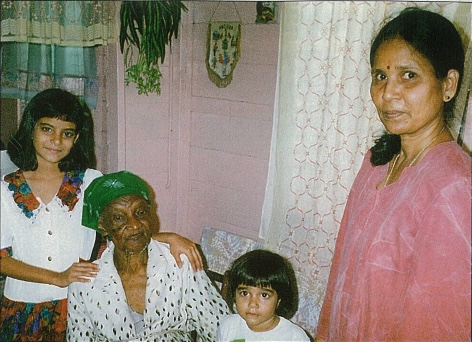By Lavina Melwani
The pleasant breeze was gradually turning into a howling wind. As Dr. Jagdishwari Nala sat at her desk at home in Barbados doing some paperwork, leaves were swirling around, the sky was darkening and the windows were rattling, Her friends telephoned, warning that a major hurricane was on its way. Knowing she lived alone, they advised her to leave home quickly and come spend the night with them. Nala left reluctantly. That night the hurricane struck. “I had left all my papers on the desk, the windows were half open. In my heart I wondered, what is going to happen to my home? Then I told God, ‘The house is in your hands, you take care of it.’ ”
The hurricane took its toll. Water and uprooted trees were everywhere, roads strewn with debris. Nala walked home, her heart sinking. A neighbor’s roof had landed in her yard, fallen branches everywhere. But when she entered her house, she was amazed. “Believe it or not–not a single paper had moved from the desk. These had been 80 miles an hour winds–yet there was not a drop of water in the house. The bed was dry, my shrine was untouched. Not even a leaf had entered the kitchen, nor were the glasses on top of the dresser disturbed. What do you call this? I think it’s a miracle.”
Such miracles have made living alone a fear-free and contented existence for Nala. While most single Indian women do live abroad in families, she remains by herself. A pediatrician, she came to Barbados in 1975 from Vizagapatnam in South India. A colleague was leaving for the island. Intrigued, Nala got the address of the Barbados hospital from him and applied for a posting. She got a cable back from Queen Elizabeth Hospital–the job was hers. She went initially for two years but has stayed on and gradually started her own clinic in the hospital. Barbados has become home, but she goes back to India once every two years.
Though Nala now lives in the West, she has kept her childhood Hindu traditions, such as an early morning bath and prayers, and a strict vegetarian diet. Indian cuisine is not easily available in Barbados, where 80% of the population is African and Indians are a very small minority, but as long as there are plenty of fruits and yogurt, she is content. Nala frequents the Hindu Temple as well as the Sai Baba Center. She has devoted her days to the Sai Center where about 30 devotees gather for satsang. She leads Sunday classes at the Bal Vikas, teaching the children about the Ramayana, about Sanskrit slokas and about Ganesha. She says, “Children have a lot of Western influences, and they do not know enough about our Indian culture. We have to educate them so they don’t forget our culture.” There are two age groups, three up to age nine, and from nine to 13. She smiles, “We teach them to chant slokas. They chant wonderfully.”
This doctor has found the true meaning of life by unstinting giving. She works long hours at the hospital and spends a lot of her leisure time helping others. She says, “At the Sai Center we have a lot of service activities–you have to elevate yourself by serving others. You serve God when you serve people.” She and other satsangis visit and uplift the aged and the sick amongst the impoverished in the Barbaddan communities. They evaluate their living conditions and bring changes for the better.
Nala recalls going with her group of helpers to clean the homes of the aged and the poor, even painting their walls and doing spring cleaning. At the same time they buy them groceries and other essentials and she sees poor patients in her clinic. She emphasizes that they don’t just give handouts but work to make them self-reliant.
Nala and her colleagues become substitute families for those who have little and no one to care for them. She recalls an 80-year-old blind woman and her 30-year-old son who was completely retarded. By interacting with them, these Sai devotees gradually taught them to stand on their own feet.
Once a week, Nala helps in the preparation of 50 lunches for the needy. Even though the Barbaddans are meat-eaters, the Sai devotees prepare a wonderful sattvic (pure) meal for them, using ingredients like peas, potatoes and rice, with plenty of fruits and fruit juices. They also often serve them a traditional Barbaddan speciality which is vegetarian–macaroni and cheese pie.
By making such a positive difference in people’s lives, both in the hospital and in the homes of the aged and the infirm, her own life is richer and fuller. Says Nala: “I used to feel lonely and homesick at times. Since I’ve got involved in spiritual activities, I feel God is with me. I may be alone, but I don’t feel lonely at all.” Indeed, God, sometimes in the guise of Siva, sometimes Sai Baba, seems to guard her and watch over her all the time. She recalls driving home from work on the narrow roads of Barbados one evening, singing bhajanas. Suddenly a huge van materialized, speeding directly toward her. There was no time to stop or to steer; she just took her foot off the accelerator, shut her eyes and intoned ‘Sai Ram!’ When she opened her eyes, there were passers-by gathering around, amazed at her narrow escape. One person told her, “You must have a real guardian angel–we thought you were a goner.” Her guardian angel seems to take care of even her most frivolous needs, almost like an indulgent and loving parent. She often gets a strong craving for sweets and when she does, without a doubt, there will be a knock on the door–a friend with some delicious freshly-made Indian sweets. Smiles Dr. Jagdishwari Nala, “When that happens–I just have to laugh!”


